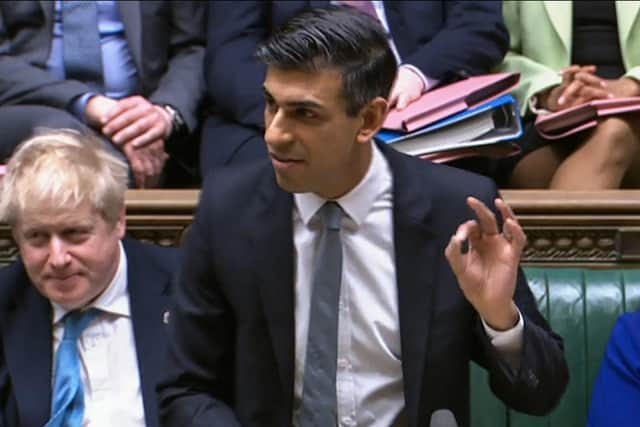The key announcements in Rishi Sunak’s Spring Statement and what it means for Scotland
While some of the measures announced in his Spring Statement have been welcomed, opposition politicians and financial experts have warned that they do not go far enough to address the escalating cost of living crisis.
Here are some of the key announcements, and what they mean for people in Scotland.
Income tax
Advertisement
Hide AdAdvertisement
Hide AdMr Sunak was cheered by the Tory backbenches after announcing that from 2024, the basic rate of income tax will be cut from 20p to 19p in the pound. He said the first cut in the basic rate in 16 years constituted a £5 billion tax cut for over 30 million people.
In Scotland, where the income tax starter rate is already 19p for those earning between £12,570 and £14,732, the agreed fiscal framework will see the Scottish Government’s funding automatically increased. It means that Mr Sunak’s cut will initially be worth £350m in 2024/25.
But while the measure will be viewed as a boon for Tory prospects at the polls, it will do nothing to help families struggling to cope with the current cost of living crisis, which is forecast to become even more acute in the months ahead.
The Office of Budget Responsibility predicts inflation will average 7.4 per cent for the rest of the year, with a peak of close to nine per cent by the fourth quarter. It said this year will bring about the biggest fall in living standards in any single financial year since records began in 1956.


National Insurance
The chancellor raised the National Insurance earning threshold to by £3,000, meaning that as of July, anyone who earns less than £12,570 will not pay a penny of income tax or NI.
Mr Sunak hailed the move as the “largest single personal tax cut in a decade” and said it amounted to a tax cut for 30 million people worth over £330 a year.
However, Labour’s shadow chancellor, Rachel Reeves said the government should have scrapped the planned 1.25 per cent NI rise in April instead of toying with the threshold., and said he was “still taking money out of people’s purses and wallets” with the increase.
Her SNP counterpart, Alison Thewliss, said Mr Sunak’s announcement was a “tax on jobs” and accused him of being “utterly detached” from the reality of people’s lives.
Advertisement
Hide AdAdvertisement
Hide AdThe Resolution Foundation said the increase in the NI threshold will mostly benefit middle-earners, while Paul Johnston, director of the Institute for Fiscal Studies, questioned the justification for cutting the income tax rate while raising the NI rate, warning that it drove a further wedge between the taxation of unearned income and earned income.
Benefits
Mr Sunak announced the doubling of the Household Support Fund, an England-only initiative, to £1bn. As the Barnett formula will apply in the usual way to additional funding in England, Scotland the other devolved administrations can expect to receive their share, to allocate as they see fit.
The amount is unclear, but when the initial £500m fund was introduced last year, the Treasury announced that the Scottish Government would receive £41m. It subsequently introduced a Winter Support Fund targeted at low income households.
Kate Forbes, Scotland’s finance secretary, was among those to criticise the announcement, pointing out that Mr Sunak said nothing about uprating benefits, reducing energy bills, or additional cold weather payments. She said the interventions announced by Mr Sunak were “woeful.”
Mr Johnson said the “big omission” from Mr Sunak’s statement was any help for those subsisting on mean tested benefits, who face cost of living increases of around 10 per cent, with their benefits only rising by 3.1 per cent.
Fuel duty
On the day that the average cost of a litre of petrol at UK forecourts surged to a new record high of 167.3p, fuel duty was cut by 5p per litre. Mr Sunak described it as “the biggest cut to all fuel duty rates ever” and said the measure, which will be in place for a year, will benefit “hard working” families and businesses.
But there is an argument that the cut could - and should - have been deeper., not least in light of the fact that the average price of a litre of petrol has surged by more than 40p in the past year, meaning that the government is receiving an extra 7p per litre in VAT. According to the RAC, the duty cut will reduce the cost of filling a typical family car by around £3.30.
The measure has also drawn criticism from those who point out that car ownership levels are at their lowest among poorest households.
Energy efficiency
Advertisement
Hide AdAdvertisement
Hide AdMr Sunak has scrapped the five per cent VAT rate on a range of energy efficiency home improvements, such as solar panels and heat pumps.
The renewables industry has long called for such measures as a route to lowering demand for gas and reducing household energy bills.
It is not clear whether the tax relief applied only to the purchases of the materials and products themselves, or also to the installation of them, which represents a significant expense from households looking to make energy efficiency improvements.
Ms Reeves described the announcement as “wholly inadequate” and followed “12 years of failure on energy efficiency.”
A message from the editor:
Thank you for reading this article. We're more reliant on your support than ever as the shift in consumer habits brought about by coronavirus impacts our advertisers. If you haven't already please consider supporting our trusted, fact-checked journalism by taking out a digital subscription.
Comments
Want to join the conversation? Please or to comment on this article.
